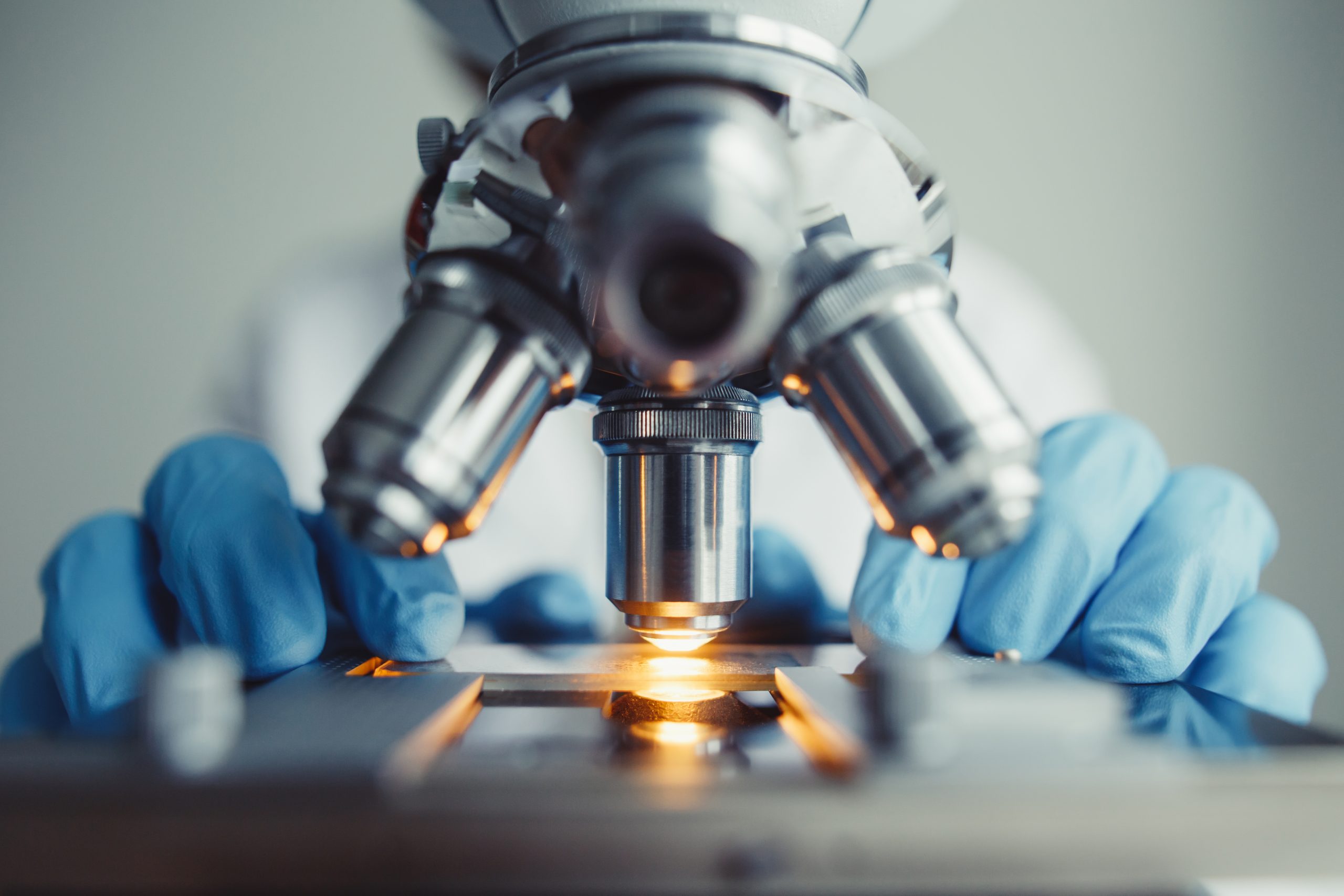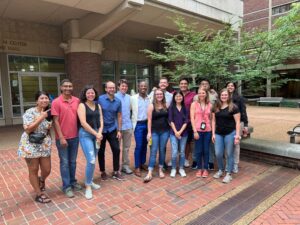Lars Plate
Associate Professor of Chemistry & Biological Sciences
Dr. Plate will be accepting graduate students for Fall 2026.
|
Lars grew up in northern Germany and first moved to the USA to earn his BS in Chemistry at the Massachusetts Institute of Technology. He conducted research in the group of JoAnne Stubbe where he investigated the subunit interactions of the enzyme ribonucleotide reductase. For his doctoral work, Lars studied bacterial nitric oxide gas sensing proteins and signal transduction pathways with Michael Marletta at the University of California, Berkeley. He completed his PhD in Molecular and Cell Biology with emphasis in Chemical Biology in 2013. He then joined the groups of Jeff Kelly and Luke Wiseman at the Scripps Research Institute in La Jolla, CA for his postdoctoral training, where he used chemical biology and proteomics approaches to investigate endoplasmic reticulum (ER) proteostasis pathways and protein quality control mechanisms. He defined how these processes can be targeted therapeutically to treat diverse protein misfolding and aggregation diseases using newly identified small molecule ER proteostasis regulators. Lars joined the faculty at Vanderbilt in 2017. Our research interests lie at the interface of chemistry and biology investigating how protein-protein interaction networks are dynamically regulated in diverse cellular processes, such as protein quality control or virus infections. We develop quantitative proteomics approaches to profile transient protein complexes, and then leverage new insights on the dysregulation of protein interaction networks in disease states to guide the development of therapeutic strategies. All our projects are highly interdisciplinary and collaborative. Our lab emphasizes effective mentorship, professional development, trainee well-being, and promoting diversity and inclusiveness in the scientific community.
1. Dynamics of chaperone interactions with client proteins during folding and secretion: Protein folding and assembly inside cells rely on the coordinated action of chaperones, co- chaperones and other quality control factors that comprise the proteostasis network. Our goal is to monitor the sequential engagement and interaction dynamics between client proteins and proteostasis network components during cellular protein folding. We develop mass spectrometry tools for time-resolved interactomics coupled to chemical biology labeling approaches. Using these approaches, we explore how altered progression of client proteins through proteostasis pathways can affect the quality of the folded proteins and lead to protein misfolding diseases. This can reveal previously invisible mechanisms responsible for the quality control defects in protein misfolding diseases and identify new strategies for disease intervention.
2. CFTR interactomics to elucidate divergent drug responses and improve precision medicine: Approved cystic fibrosis corrector drugs improve the folding and trafficking of disease-causing mutant variants of the cystic fibrosis transmembrane conductance regulator (CFTR). These drugs have historically targeted F508del CFTR, the most common disease-causing variant, but they have shown varying efficacy against less common CFTR mutations. Comparing the CFTR interactomes for a range of mutations and treatments targeting discrete aspects of CFTR biogenesis has allowed us to identify the underlying factors that govern the divergent response of rare CFTR variants. Our findings open the door to exploring additional proteostasis targets for future therapeutic intervention.
3. Host-pathogen protein interactions during flavivirus and coronavirus infections: Viruses have evolved sophisticated strategies to co-opt host cellular processes to facilitate viral replication. In particular, hijacking of proteostasis pathways has emerged as a common strategy for viral replication that might extend beyond simply facilitating the folding of viral proteins. Our research elucidates the timing and coordination of host pathogen protein interactions throughout the viral life cycle with a particular focus on uncovering novel dependencies on the host proteostasis pathways. Our discoveries point to new host processes as therapeutic targets to combat infection of several widespread viruses that pose global health threats, such as coronaviruses, dengue, or Zika. |
Specializations
| Chemical Biology Biochemistry Cell Biology Proteomics Virology Enzymology Drug discovery VICB |
Representative Publications
McDonald EF, Kim M, Olson III JA, Meiler J, Plate L. Proteostasis Landscapes of Selective versus Poorly Responsive CFTR Variants Reveals Structural Vulnerabilities to Correction. PNAS. 2025 (122): e2418407122; doi: https://doi.org/10.1073/pnas.2418407122
Wright MT, Timalsina B, Garcia Lopez VA, Hermanson JN, Plate L. Time-Resolved Interactome Profiling Deconvolutes Secretory Protein Quality Control Dynamics. Molecular Systems Biology. 2024 (20): 1049; doi: 10.1038/s44320-024-00058-1
Egly CL, Do TQ, McDonald EF, Barny L, Knollmann B, Plate L. The proteostasis interactomes of trafficking-deficient variants of the voltage-gated potassium channel KV11.1 associated with Long QT Syndrome. Journal of Biological Chemistry. 2024 (300): 107465; doi: 10.1016/j.jbc.2024.107465
Davies JP, Sivadas A, Keller KR, Roman BK, Wojcikiewicz RJH, Plate L. Expression of SARS-CoV-2 Nonstructural Proteins 3 and 4 Can Tune the Unfolded Protein Response in Cell Culture. Journal of Proteome Research. 2024 (23): 356; doi: 10.1021/acs.jproteome.3c00600
Kim M, McDonald EF, Sabusap CMP, Timalsina B, Joshi D, Hong JS, Rab A, Sorscher EJ, Plate L. Elexacaftor/VX-445-mediated CFTR interactome remodeling reveals differential correction driven by mutation-specific translational dynamics. Journal of Biological Chemistry. 2023 (229): 10524;
doi: 10.1016/j.jbc.2023.105242
Almasy KM, Davies JP, Plate L. Comparative host interactomes of the SARS-CoV-2 nonstructural protein 3 and human coronavirus homologs. Molecular & Cellular Proteomics. 2021 (20): 100120; doi: 10.1016/j.mcpro.2021.100120
Almasy KM, Davies JP, Lisy SM, Tirgar R, Tran SC, Plate L. Dengue and Zika virus infection are impaired by small molecule ER proteostasis regulator 147 in an ATF6-independent manner. PNAS. 2020 118(3): e2012209118; doi: 10.1073/pnas.2012209118
Davies JP, Almasy KM, McDonald JF, Plate L. Comparative multiplexed interactomics of SARS-CoV-2 and homologous coronavirus non-structural proteins identifies unique and shared host-cell dependencies. ACS Infectious Diseases 2020 (6): 3174; doi: 10.1021/acsinfecdis.0c00500


